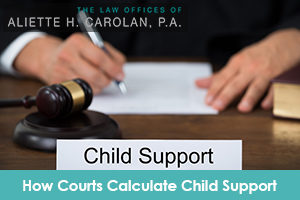 In Florida, the state believes each parent has a fundamental obligation to support their minor children. Consequently, the child support guidelines are based on the parents’ combined net income, just as if the parents and child were still living in the same home. The state has child support guidelines that are presumed to be the right fit for families. However, the court may deviate from the guidelines by as much as 5 percent, taking into consideration the following:
In Florida, the state believes each parent has a fundamental obligation to support their minor children. Consequently, the child support guidelines are based on the parents’ combined net income, just as if the parents and child were still living in the same home. The state has child support guidelines that are presumed to be the right fit for families. However, the court may deviate from the guidelines by as much as 5 percent, taking into consideration the following:
- the needs of the child;
- their station in life;
- the age of the children;
- their standard of living; and
- the financial status and ability of each parent.
Courts consider a series of factors defined by Florida Law. Courts also consider the amount of time the child spends with each parent.
Factors Courts Consider in Calculating Child Support
The court considers the following when calculating child support:
- the income of each parties each month, including:
- salary and wages;
- bonuses, overtime, commissions, tips, etc.;
- business income;
- disability benefits;
- unemployment compensation;
- workers’ compensation;
- pension or retirement income;
- social security benefits;
- previously ordered spousal support;
- rental income;
- income from trusts, royalties, etc.;
- interest or dividends; as well as
- other sources of income.
- If a party is voluntarily unemployed or underemployed, the court assesses presumed income to that party using a detailed list of factors; and finally,
- The court considers deductions to income such as tax deductions, union dues, some health insurance costs, other child support orders, and previously ordered child support.
Once the court considers the net income of each party, the court adds the income together to arrive at a combined net income.
Child Support Obligations
The courts review a guidelines schedule determining how much child support each child needs, based on the number of children and the combined net income.
In Florida, child support obligations extend beyond a simple fraction of income. Additionally, child care costs, health insurance costs, and non-covered medical, dental, and prescription medication is included in basic child support obligations.
Finally, courts determine each parent’s percentage obligation of child support need by dividing each parent’s net monthly income by the combined net income. Courts then consider the amount of parenting time each party has with the child.
In short, child support obligation calculations are a complicated process. At many stages of the calculation exceptions can be made, depending on the circumstances of the individual family. Consequently, child support calculations are not always a straightforward mathematical formula in Florida. For this reason, having a qualified family law attorney on your side is essential to making sure your child’s needs are at the forefront of any child support calculation.
If You Have Children and Are Considering Divorce
If you have children and are considering divorce, many choices lay before you. These include shared parenting time, child custody decisions, and child support calculations. Don’t face these decisions alone. You and your family will benefit by having an experienced divorce attorney on your side, guiding you every step of the way. All too often, families enter divorce proceedings without a clear understanding of Florida law, including the many options available to them. Rather than a one size fits all divorce, at the Law Offices of Aliette H. Carolan, P.A., we strive to find divorce solutions that fit you and your family’s particular situation. Contact us today to schedule a consultation at 305-358-2330.
Additional Reading
Legally Accepted Reasons for Not Paying Child Support in Florida
Do You Have to Pay Child Support if You Have No Income?
